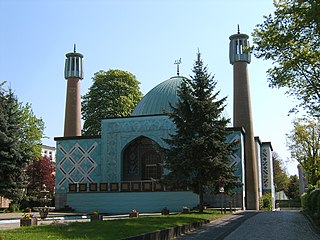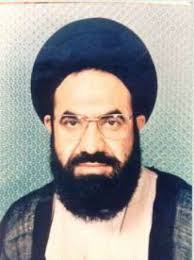
Shia Islam in Canada is a part of the global Shia community that continues to bond with Shias elsewhere. Shia Muslims have been a featuring segment of the Canadian Muslim society that became more conspicuous from the 1970s and onwards. [1]

Shia Islam in Canada is a part of the global Shia community that continues to bond with Shias elsewhere. Shia Muslims have been a featuring segment of the Canadian Muslim society that became more conspicuous from the 1970s and onwards. [1]
The Shia Muslim community (jamaat) manifests itself in two main forms in Canada. One is through the Twelver (Ithnaasheri) rite and the other is through the Ismaili (Sevener) rite. However, due to the lack of census questions that go into specific details in Canada, it remains unknown which community is larger between the two. [2] However, both have established community centres encompassing spiritual congregational halls and attached leisure centres. The Shia Ithnaasheris have Masjids (Mosques) and the Shia Ismailis have Jamatkhanas in the country. The two most prominent Ismaili centre is the Ismaili Centre, Toronto (ICT) at the Charbagh Gardens and Ismaili Centre, Burnaby (ICV), while the most prominent Ithna Ashari centre is the Jaffari Community Centre (JCC) in Vaughan, Ontario. [3]
The Shiite population in Canada is estimated to be approximately 300,000 people. The arrival of Shiite Muslims in this country is because of the migration of Shiites from countries such as Iran/Pakistan/Lebanon, and other countries that have settled there, and most of the mentioned population lives in cities such as Toronto, Montreal, and Vancouver. [4]
Reza Hosseini Nassab is a Canadian Grand Ayatollah of the Twelver rite. Anisa Mehdi, a film director and journalist, who although a Shia, reports on her faith from a Pan-Islamic viewpoint. [5]

The Islamic Supreme Council of Iraq is a Shia Islamist political party in Iraq. It was established in Iran in 1982 by Mohammed Baqir al-Hakim and changed its name to the current Islamic Supreme Council of Iraq in 2007. Its political support comes from Iraq's Shia Muslim community.
In Shia Islam, the Imamah is a doctrine which asserts that certain individuals from the lineage of the Islamic prophet Muhammad are to be accepted as leaders and guides of the ummah after the death of Muhammad. Imamah further says that Imams possess divine knowledge and authority (Ismah) as well as being part of the Ahl al-Bayt, the family of Muhammad. These Imams have the role of providing commentary and interpretation of the Quran as well as guidance.

The Islamic Centre Hamburg is one of the oldest mosques in Germany and Europe and is abbreviated IZH. Established in Hamburg, in northern Germany, in the late 1950s by a group of Iranian emigrants and business people.
Iranian Canadians or Persian Canadians are Canadians of Iranian origin. From the 2016 Canadian census, the main communities can be found in Southern Ontario, British Columbia, and Quebec. The vast majority, however, live in northern suburbs of Toronto such as Richmond Hill, Vaughan, Markham, and Thornhill, and in certain municipalities of Vancouver, including North Vancouver, West Vancouver, Burnaby, and Coquitlam. As of 2016 a total of 97,110 Iranians reside in the Greater Toronto Area, 46,255 in the Greater Vancouver Area, and 23,410 in the Greater Montreal Area, with the remainder spread out in the other major cities of Canada, based on the 2016 Canadian Census. These numbers represent the people who stated "Iranian" as their single or joint ethnic origin in the census survey.
In Shi'a Islam the guidance of clergy and keeping such a structure holds great importance. There are several branches of Shi'ism, of which Twelver Shi'ism is by far the largest, and each of the branches has different clergy structures. Individual clerics are referred to as mullā or ākhūnd, but since those terms have developed "a somewhat pejorative connotation" since at least the 1980s, the term rūḥānī has been "promoted" as an alternative, "especially by the clerical class itself".
Jaʽfar, meaning in Arabic "small stream/rivulet/creek", is a masculine name of Arabic origin, common among Muslims especially in Iran.

Syed Arif Hussain Al Hussaini was an Twelver Shīʿā Islamic religious cleric, Islamist ideologue, Muslim philosopher, jurist, historian, activist and scholar active in Pakistan. He is known as the Islamic Revolutionist leader of Shia Muslims in Pakistan and founder of Shia Islamist Movement Tehrik-e-Jafaria in Pakistan. He is also known as Khomanei-e-Pakistan. He viewed the ideas of secularism, nationalism, liberalism and socialism as evil, which he understood to be the influence of Western and Soviet imperialism.
Husseini is an Arabic surname.
Nizari Ismaili Muslims around the globe are governed by one universal constitution known as "The World Constitution".
The History of Nizari Isma'ilism from the founding of Islam covers a period of over 1400 years. It begins with Muhammad's mission to restore to humanity the universality and knowledge of the oneness of the divine within the Abrahamic tradition, through the final message and what the Shia believe was the appointment of Ali as successor and guardian of that message with both the spiritual and temporal authority of Muhammad through the institution of the Imamate.

Seyed Reza Hosseini Nassab is an Iranian Twelver Shi'a Marja, currently residing in Canada. He was the President and Imam of the Islamic Centre in Hamburg, Germany, and since 2003 he has served as the President of Shia Islam Federation in Canada.

The Ismaili Centre, Vancouver, is one of six Ismaili Centres worldwide. It was the first purpose-built Ismaili jamatkhana and the first Ismaili centre in North America. It has accordingly been the subject of sustained, dedicated academic analysis, a case study of modern Islamic architecture in the West.

The Najaf Seminary, also known as the al-Hawza Al-Ilmiyya, is the oldest and one of the most important Shia seminaries (hawza) in the world. It is located near the Imam Ali Mosque in the city of Najaf in Iraq, and also operates a campus in Karbala, Iraq. It was established by Shaykh al-Tusi, and continued as a center of study after the establishment of modern Iraq in 1921.
Isma'ilism is a branch or sub-sect of Shia Islam.

Reza Ramezani is a Twelver Shia Muslim cleric with the religious Rank Ayatollah. He has been a member of the Expert Council in the Islamic Republic of Iran since 2006. From 2009 to August 2018, he was head and director of the Islamic Center Hamburg, the center of Shiite Islam in Germany. Before working in Hamburg, he headed the Islamic Center Imam Ali Vienna. He is the Secretary-General of the Ahl Al-Bayt World Assembly and the representative of Gilan in the Assembly of Experts. Between 2001 and 2005, he represented the Supreme Leader and the Friday Imams in Karaj.